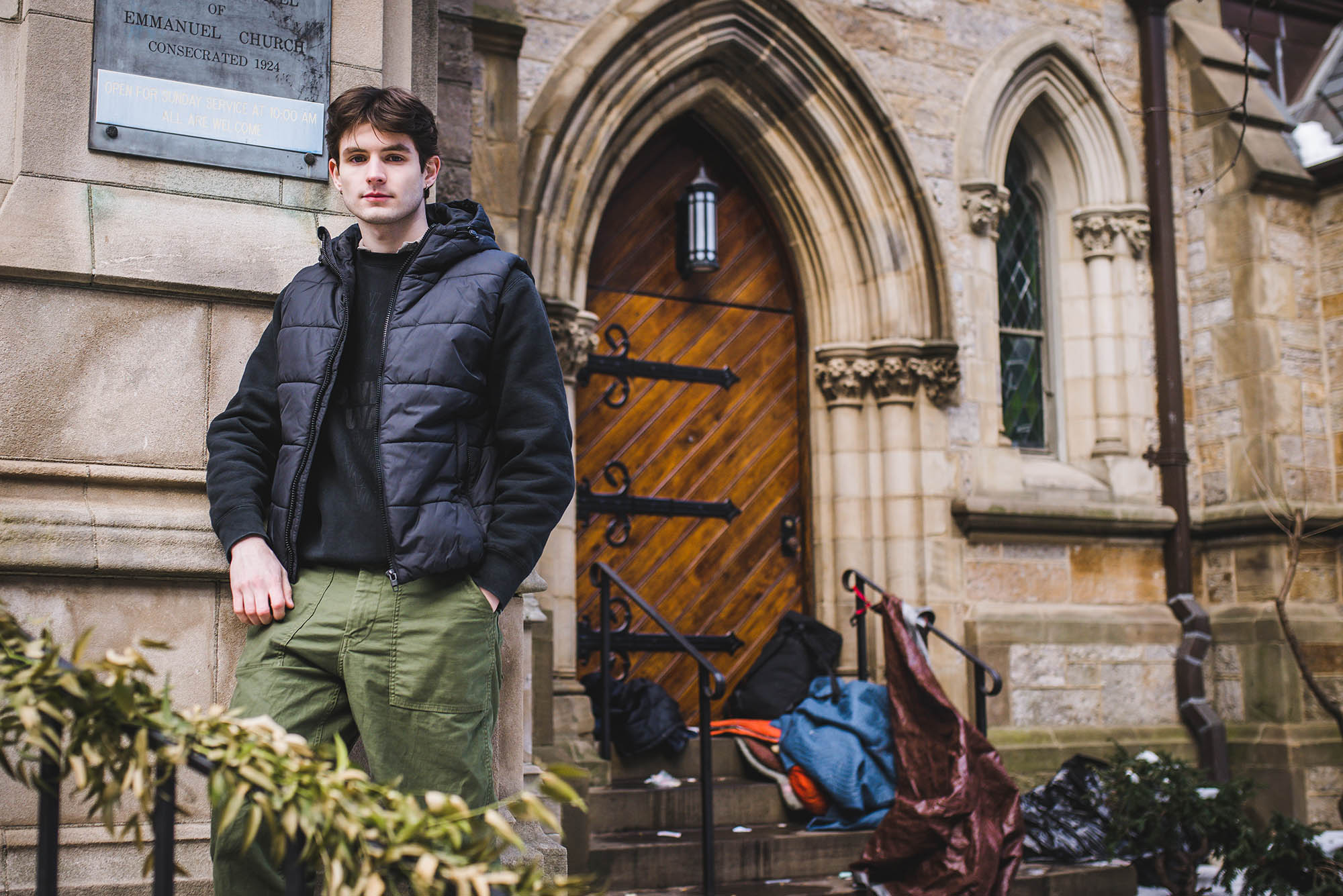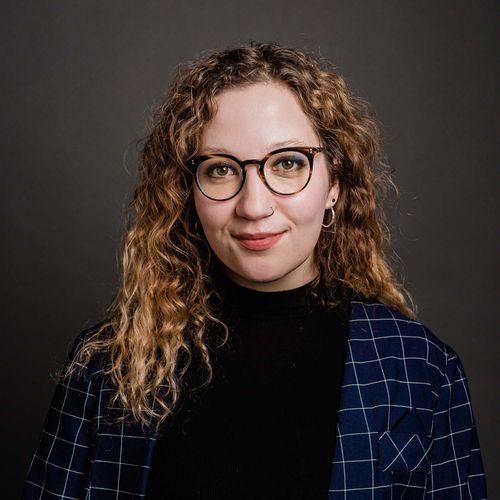BU Student Documents the Local Homeless Experience on TikTok
Ben Myers’ Food for Thought project seeks to give a voice to unhoused people in Boston

Food for Thought founder Ben Myers (CGS’22, CAS’24) outside Emmanuel Church, a day shelter on Newbury Street where he films his videos featuring interviews with people who are currently unhoused.
BU Student Documents the Local Homeless Experience on TikTok
Ben Myers’ Food for Thought project seeks to give a voice to unhoused people in Boston
Just one night sleeping on the street during a cold Boston winter is traumatic, Reverend Carrington Moore (STH’14) states in a Food for Thought TikTok video. Moore is executive director of Common Cathedral, a nonprofit ecumenical church community that serves the homeless.
“It’s like 15 degrees outside, and people are sleeping with a coat, with some shoes, and some socks. That’s traumatic if you experience that one night. Imagine if you put 100 nights on that. Or you put two or three years on that,” says Moore, speaking to an off-screen interviewer.
That interviewer? Ben Myers (CGS’22, CAS’24), the student filmmaker behind Food for Thought, a research and video project documenting homelessness in Boston.
The project, which Myers primarily shares through TikTok, has two main goals: educating the public about the root causes of homelessness and providing unhoused persons with a platform to share their stories. So far, the Food for Thought TikTok account has more than 43,000 followers and over one million likes on all the videos combined.
“Our sort-of motto is ‘humanizing humans,’” Myers says. His interviews with individuals connected to or experiencing homelessness aim to “help viewers understand their problems, and really connect with them. A lot of people would not be willing to have these conversations in the first place. We bridge that gap by asking [unhoused persons] the questions that nobody else will ask.”
Questions like: What factors in your life led to homelessness? What kinds of resources do you need to get out of homelessness? What are some systemic barriers to accessing those resources? What are some of the stigmas you face? And what makes you happy?
The answers are wide-ranging. In one video, local resident Sean Joseph Leblanc, who goes by “Bonezy,” describes childhood trauma that he says set in motion a series of tragic events in his life, ultimately leading to addiction and homelessness. In another video, Leblanc discusses applying for permanent housing, a process that can take months of legwork to complete.
@fftboston What makes you happy? Bonezy, a man experiencing homelessness in Boston recalls a recent event that made him happy. #homeless #homelessness #interview #fyp #sad #sadstory #boston #shelter #happy #whatmakesyouhappy ♬ original sound – Food For Thought
Sean Joseph Leblanc, known as “Bonezy,” talks about what makes him happy.
Video by Food for Thought Boston
Myers first conceptualized a project on homelessness as a freshman in the College of General Studies. According to the Massachusetts Coalition for the Homeless, there are just over 18,000 unhoused people living in the commonwealth. Boston encampments include the area known as Mass. and Cass, a volatile corridor near the intersection of Massachusetts Avenue and Melnea Cass Boulevard that often has hundreds of residents at a time. Myers had seen content on social media documenting the unhoused experience in other cities—but surprisingly, almost nothing in Boston, he says.
“I realized that there are a lot of people experiencing homelessness in Boston,” Myers explains, “and that they’re going to have thoughts on systemic problems with the city and shelters and things like that.” With his interviews, “a lot of my questions are oriented toward understanding what the unhoused in Boston need to better their situations.”
The greatest goal of his interviews, however, is just to let people talk.
“I’ve realized that everyone has a story to tell,” Myers says. “Some of these folks have been through hell and back, and all they want to do is talk to new people and tell their stories—but most people won’t give them the time of day.” For a lot of the people he’s interviewed, having someone sit down and listen to them—cameras on or off—is “like therapy,” he says.
Food for Thought is one of several projects endowed by alum Gary Kraut’s (CGS’64, COM’66) Social Impact Research Fund (SIRF), a grant that allows College of General Studies students to pursue a socially conscious research project under the mentorship of CGS faculty. Natalie McKnight, CGS dean and professor of humanities, is Myers’ mentor.
The SIRF grant allows Myers to focus on the project full-time outside of classes. It also lets him reimburse each interviewee for their time: he distributes items like food, hats, blankets, and gloves to every person he talks to. (“I try to make it somewhat of a mutual exchange, but regardless of whether someone wants to talk to me, I’ll still provide them with resources,” he says.) He films at Emmanuel Church on Newbury Street, where Common Cathedral runs a day center for unhoused people, with the help of his roommates Samuel Ashton (CAS’24, COM’24) and Spencer Price (CGS’22, CAS’24). Reverend Moore was happy to let the students talk to residents, Myers says.
Myers plans to continue his project through the summer. Eventually, he hopes to turn Food for Thought into a 501(c)(3) nonprofit, which would allow him to accept donations and purchase additional resources—such as prepaid phones—to distribute. It would also help him facilitate longer-term solutions to homelessness, like job-placement programs with local employers.
Myers isn’t trying to be a lobbyist, he says. Rather, he’s trying to open the public’s eyes to the intricacies of homelessness through the accounts of people who understand it best. If his videos inspire policymakers to draft legislation aiding the unhoused or simply create empathy among viewers on TikTok, all the better.
The impact his videos have had so far is clear in the thousands of comments they’ve received. “Some of the best people I’ve met are people society throws away,” one person wrote. “How can I help? This is my new favorite account,” said another.
That’s always heartening to see, Myers says.
“Our videos have thousands and thousands of comments from people talking about their struggles with drug use and homelessness, and what they did to get out of it,” Myers says. “I think these conversations are helpful, because they contribute to a friendly environment where people can feel okay being vulnerable about their tough life experiences.
“It feels like what I’m doing is having a positive impact on the community—and that’s important to me,” he adds. “I don’t know if I’ve ever been able to say that before, and it feels good to be able to say it now, confidently.”


Comments & Discussion
Boston University moderates comments to facilitate an informed, substantive, civil conversation. Abusive, profane, self-promotional, misleading, incoherent or off-topic comments will be rejected. Moderators are staffed during regular business hours (EST) and can only accept comments written in English. Statistics or facts must include a citation or a link to the citation.